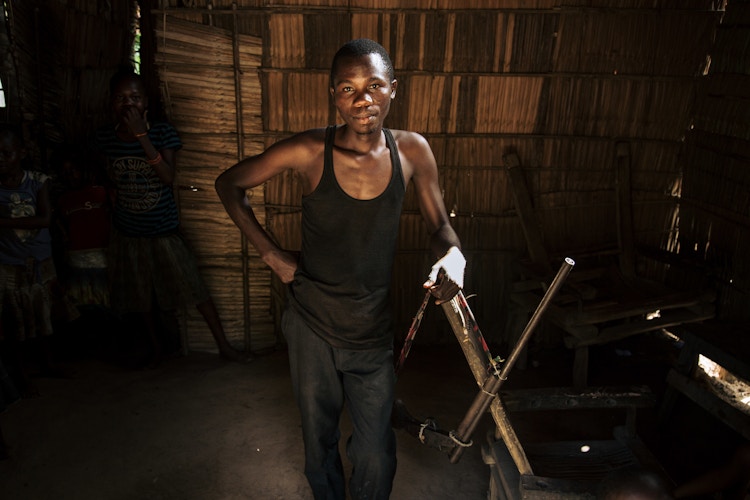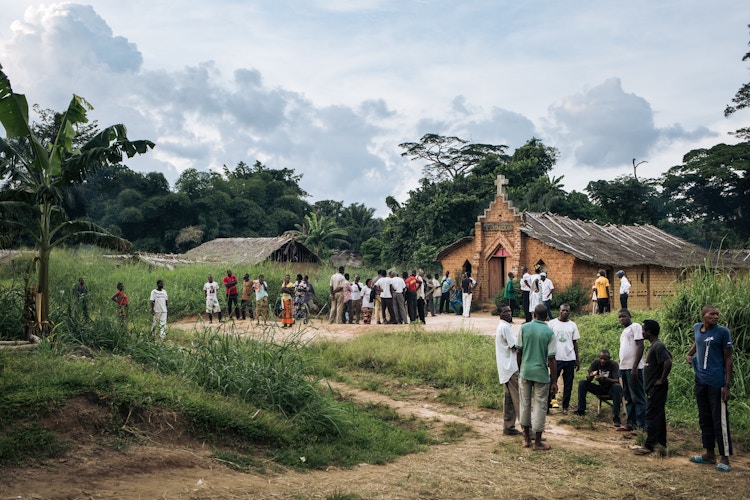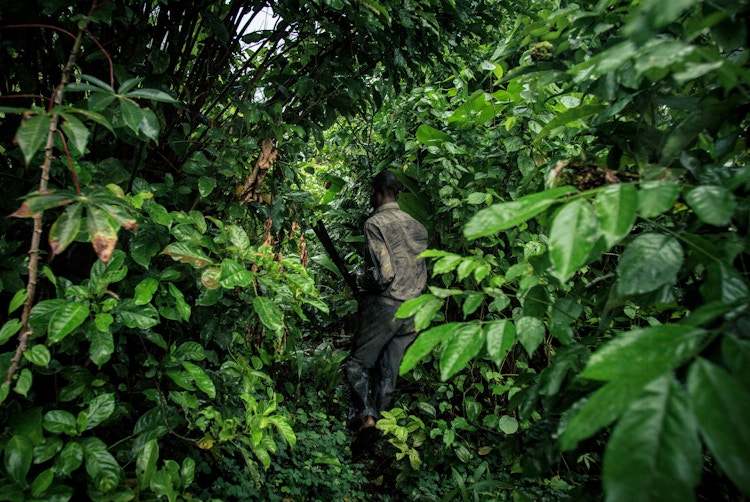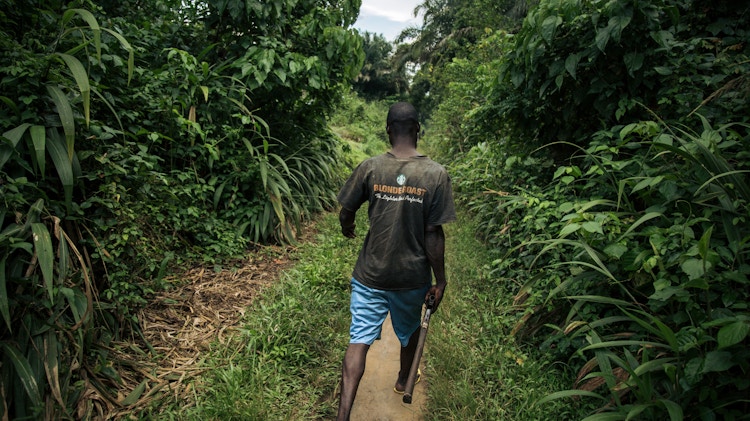"This is our project, these are our lands"
For most of the people living in and depending on the Congolese rainforest for their survival, securing rights to their traditional lands has been out of reach. This is now changing, as the government has begun to implement a law that gives communities the right to obtain a Community Forest Concession to manage the lands they have lived on for centuries.

Cultivating ownership by forest communities
In 2012, Rainforest Foundation Norway (RFN) was looking for a forest community in Equateur province willing to collaborate with RFN and our Congolese partners SPFA to develop a new project. The particularity of this project was that the community itself would decide what they would need and what our support would look like. The prospecting team traveled along the Mbandaka-Boende road to meet several communities and finally arrived at the village of Penzele, a three days drive from Mbandaka, the capital of the province.
The wildlife is very rich, and industrial logging is still non-existent in the Penzele area despite the existence of an inactive industrial forest concession overlapping on their land. However, several prospectors visits have been reported by the communities. Exploitation activities by Chinese companies, already reported only 45 kilometers from Penzele, are progressing rapidly, and the communities are afraid to see their forest stolen from them.
The surrounding forest is rich, with a vast primary flooded forest near the village. The community depends heavily on the forest for their subsistence. The local diet is very much based on what they pick during their walks: caterpillars, young Marantaceae roots, mushrooms. Construction materials are also sourced from the forest; walls, roofs, mats, vine, and leaf chairs.
In 2012, RFN and its partners agreed with the communities to set up the project in their traditional areas. A set of facilitation tools such as participatory mapping were used to encourage the discussions and consensus around forest management and the project itself so that the community would identify the project goals.
They decided on two goals:
- To secure their traditional forests in order to avoid outsider land-grabbing and the destruction of their unique source of subsistence
- To improve their livelihoods by developing sustainable income-generating activities based on their traditional resources and knowledge
By: Marine Gauthier*
Deep in the rainforests of Equateur province, Rainforest Foundation Norway (RFN) has over many years supported a community of forest guardians to prepare for this opportunity. In 2019 there was great change afoot as they were granted a community forest concession on their traditional lands. With this official recognition of their customary rights, they can oppose any attempt from external actors to exploit their forests. From now on, the forest community is the rightful owner of its future.

A young hunter from Penzele poses at home with his gun. Photo: Alexis Huguet/Rainforest Foundation Norway
Participatory approaches are opening a new way towards community ownership of forests and forest governance programs. Such changes hold the promise better results in terms of better crop yields and in so many other ways.
After decades of experimentation, the assessments of forest governance projects in relation to local communities and indigenous peoples are often a failure. Many development programs see limited results, low ownership of projects by beneficiaries, and sometimes even rejection. Such examples include refusal to plant or abandonment of plantations by communities, in the case, for example, where the location and planting system would not be in line with local land dynamics and were decided precisely without the participation of the communities.
This has a significant impact on their willingness to participate in the various stages of implementation and to apply decisions taken in terms of changes in agricultural practices, for example. The agricultural component of the project is essential and represents a strong demand from the community: they needed improved yields. Now the challenge is to link them with the market demand in order to improve their income.
“Together we have achieved a great victory and based on this we can now work to improve the Penzele people’s livelihoods, based on their needs and decisions. We are currently jointly developing income-generating activities and entrepreneurial programs to be implemented in the Penzele, Embondo and Bongonda communities”, says Kévin Sasia, RFN’s Africa Director.

Residents of Penzele participate in the ceremony to award their forest title. Photography: Alexis Huguet/Rainforest Foundation Norway


What difference does a community-driven approach make?
In Penzele, the community members are not beneficiaries but decision-makers. “These are our lands, this is our project”, proudly says Jacques, Penzele’s pastor, “We have defined our two objectives together with our partners, RFN, SPFA, and GASHE. Then we went through different activities, such as participatory mapping, in order to get our concession.”.
Thanks to the use of participatory tools, the project enjoys broad support at the community level. People are informed and involved at every stage. Although legitimate and useful debates and disagreements on some of the project's central elements pop up now and then, the vast majority of Penzele residents understand and support the project.
By promoting participatory tools, implementing pilot projects, and engaging in high-level processes such as the climate change negotiations or the Land Tenure reform, they successfully lobbied the DRC government and its financial partners into adopting the Community Forest Concession decree in 2014.
“Civil society organizations have fought hard to obtain the right for communities to secure their own lands. Communities have customary rights, but very often they see their lands seized for exploitation or conservation, and they lose their home, their only source of food and of revenues”, says Dédé Molala, SPFA coordinator. “Thanks to our advocacy work, in 2014, it became possible for a community to claim a forest concession, an official recognition. A sustainable future becomes possible only when you secure your lands.”
The possibility for a community to secure its lands is the result of years of joint advocacy from civil society at the national level. RFN partners, such as CAGDFT and the national network RRN, are actively working to push the government to adopt rights-based approaches to forest management and to promote community-based forest protection.

Residents of Penzele gather in front of a village church after a meeting with RFN's local partners. Photo: Alexis Huguet/Rainforest Foundation Norway
It thus provides security for the community's land, which is no longer legally subject to possible land grabbing. Altogether, it means the community is on a path towards rights-based forest protection and the development of new income-generating activities.
The village organized a two-days celebration bringing together all the inhabitants, customary and administrative authorities, as well as civil society partners, RFN and a representative of the French Embassy and the Norwegian government, as they have all supported this project.
The Penzele, Embondo and Bongonda concession, issued by the Governor of Equateur Province, allows the customary rights of the different clans to be officially recognized in the Congolese law. They are materialized in the form of a collective territory, on the basis of the limits defined by the community itself.
“Everything we have, we have it thanks to the forest. We needed to have a concession because if our lands are property of the state, it can give it away to someone else. We would lose everything. Now, the forest is finally our property. We can use it properly, our own way.”
-Christine, a woman of Penzele.
Now that their lands are secured, the communities of Penzele, Embondo and Bongonda are ready and eager to develop sustainable income-generating activities. All together, they are paving the way towards rights-based forest protection in DRC, based on inclusivity and participation principles.
Activities of participatory mapping, identification of the main issues and potential solutions to be implemented by the community members themselves, common efforts and patience to negotiate with the Congolese government, have led to a great victory that was celebrated in May 2019 in Penzele village: the granting of the Penzele, Embondo and Bongonda community forest concession.
Participatory community development in the forest
Over the years, RFN’s local partner organizations, SPFA (Solidarité Pour la Promotion des Femmes Authoctones/Solidarity for the Promotion of Indigenous Women) and GASHE (Groupe d'Action pour Sauver l'Homme et son Environnement/(Action group to save the Human and its Environment), developed a trusting relationship with the communities and helped define the objectives and activities of a project, based on local needs and capacities.
Some of the many results emerging from the pilot project:
- Improving agricultural yields*
- Ensuring participation of all community members, including women from the conception to the decisions taken throughout the project
- Put in place a radio system in the village to enable communications
- Launched two pigsties and two canneries, at the request of the community
- Shows how community development is relevant for the forest use/protection/
Indicators were also defined by the community members themselves: Collective benefits (e. g. creation of a health center) of projects are sometimes difficult to assess at the individual level and are long-term. In order to ensure motivation and sustainable commitment to the objectives, the definition of indicators at the household level, a basic element of the village's social structure, is useful. From a participatory perspective, each household can thus set its objectives for improving living conditions, with concrete elements that can be assessed by a simple visit to the village: sheet metal house, bricks and windows, and wooden doors, kitchen utensils, bicycle, panel, battery, radio, wooden bed, mattress, chair.

Jacques, a pastor and farmer in Penzele, heads to his field. Photo: Alexis Huguet/Rainforest Foundation Norway


Aerial view of the village of Penzele. Photography: Alexis Huguet/Rainforest Foundation Norway.

“The first time we went to Penzele, we were a team of three RFN staff on motorcycles on an unpaved road, damaged by heavy rains and logging operations”, remembers Kévin Sasia, Rainforest Foundation Norway’s Africa Director. “What met us there was a community with enthusiasm, from the very first discussions, to commit collectively and protect their forests. We, therefore, chose the village of Penzele to develop this new project, a project that would be based on the people themselves”.
Sometimes there are violent conflicts, as in the case of clashes between the ERA conservation company and local communities in Mai-Ndombe in the latter's REDD+ conservation concession, where communities refuse to be imposed practice changes and express a strong distrust of this external actor who has come to their lands.
By replacing external expertise - often limited by its little knowledge of the context and without in-depth community consultation – by community empowerment, participatory approaches enable the communities to realize and fully play their role as rainforest guardians.
Beyond participatory tools, it is a paradigm shift in rainforest governance that is being offered: it is a question of putting communities back at the center of forest protection. Forest communities are no longer “beneficiaries” but recognized for their work protecting their lands for centuries and encouraged to continue in that direction.
Penzele’s example proves the efficiency of such a change of paradigm to be efficient. The community is the joint owner of the project, not feeling that any external practice in being imposed on them, the communities are engaged and committed to protecting their forest and its resources.
Read more (in French) about RFN’s approach to community forest management in the DRC.

Kevin Sasia
Forest For Life Senior Programme Manager, DRC
kevin@rainforest.no


